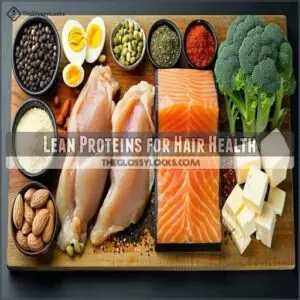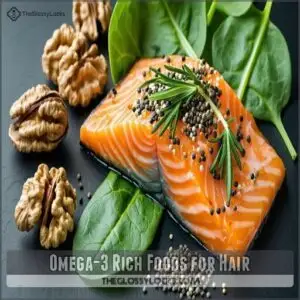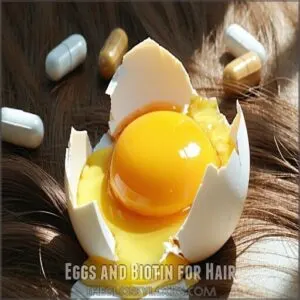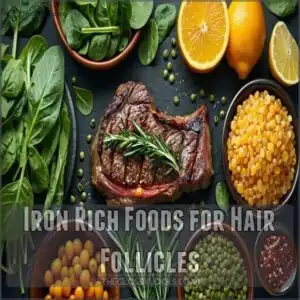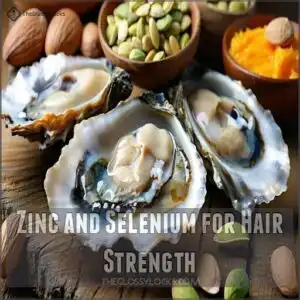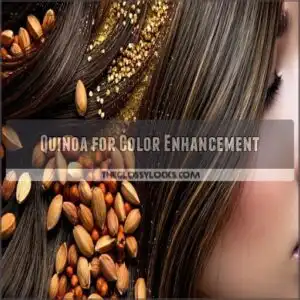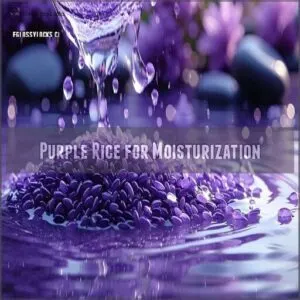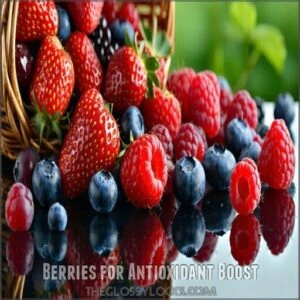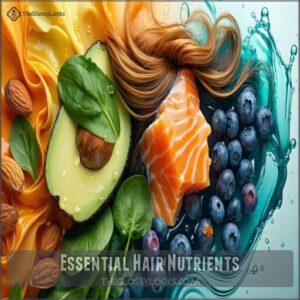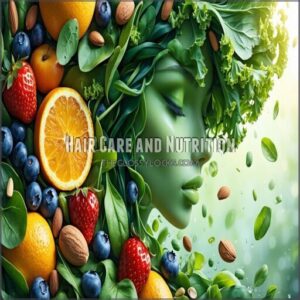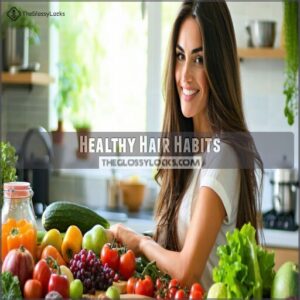This site is supported by our readers. We may earn a commission, at no cost to you, if you purchase through links.
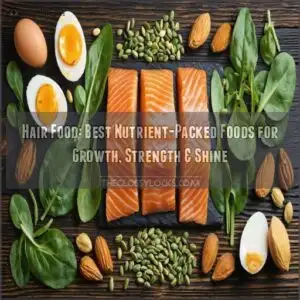
Lean proteins, like chicken or tofu, build keratin, the stuff your hair’s made of, while omega-3s in salmon or flaxseed fight dryness.
Eggs, loaded with biotin, support growth, and iron-rich foods, like spinach or beans, keep your roots thriving.
Don’t forget zinc and selenium from nuts or seeds – they’re like bodyguards for your hair against breakage.
With the right “menu,” your locks can shine brighter than a diamond.
Curious about superfoods for color, shine, and repair? You might be surprised!
Table Of Contents
Key Takeaways
- Focus on lean proteins, omega-3s, biotin, and iron-rich foods like chicken, salmon, eggs, and spinach to fuel hair growth and strength.
- Add superfoods like berries, chia seeds, and quinoa to your diet for color protection, shine, and repair.
- Stay hydrated and manage stress to support scalp health and reduce hair loss.
- Use chemical-free products and maintain regular trims to prevent damage and keep your hair vibrant.
Foods for Hair Growth
In terms of promoting hair growth, choosing the right nutrients can make all the difference.
Foods packed with protein, biotin, iron, and omega-3s give your scalp and hair follicles the fuel they need to thrive.
Lean Proteins for Hair Health
Lean proteins are essential for hair health, bolstering follicle strength and aiding hair growth.
Rich in amino acids, they’re the building blocks for keratin, your hair’s main structure.
Key protein sources to add to your diet include:
- Chicken – high in absorbable protein.
- Fish – loaded with lean protein.
- Eggs – packed with amino acids.
- Tofu – a plant-based delight.
Supplementing with nuts provides essential minerals for hair to further support keratin and overall hair growth.
Omega-3 Rich Foods for Hair
Fish like salmon and mackerel boost scalp health, improve hair density, and reduce inflammation, thanks to omega-3 fatty acids.
These healthy fats nourish follicles for better hair growth.
For vegetarians, foods like spinach, walnuts, and chia seeds are amazing alternatives.
Omega-3 benefits make these foods a must in your diet to protect and strengthen hair.
| Food | Omega-3 Benefits |
|---|---|
| Salmon | Boosts scalp health |
| Mackerel | Improves hair density |
| Spinach | Nourishes follicles |
| Walnuts | Reduces inflammation |
| Chia Seeds | Enhances hair growth |
Eggs and Biotin for Hair
If you’re looking for a top-tier hair food, eggs are your go-to. They’re packed with biotin, vital for keratin production and hair growth.
To maximize their benefits, try these tips:
- Incorporate eggs into your breakfast for maximum biotin absorption.
- Boil or scramble them for easy nutrition.
- Consider egg alternatives for biotin deficiency.
- Explore biotin supplementation cautiously.
- Maintain consistent egg preparation for hair nourishment.
Iron Rich Foods for Hair Follicles
Iron fuels hair follicles, boosting hair growth and preventing hair loss.
Red meat, rich in easily absorbable iron, helps combat iron deficiency anemia, a common cause of thinning strands.
Plant sources like spinach and lentils offer iron too, but pair them with vitamin C-rich foods to improve iron absorption.
Consider supplementation if needed—healthy hair begins with strong roots!
Zinc and Selenium for Hair Strength
Zinc and selenium are power players for hair strengthening.
Zinc boosts hair growth by supporting scalp health and assisting hair follicles’ repair cycle.
Proper selenium dosage keeps your thyroid—linked to hair health—functioning smoothly.
For better zinc absorption, pair it with vitamin C-rich foods, such as nuts, seeds, and seafood—simple staples that work wonders for stronger, healthier hair.
Nourishing Superfoods
You can boost your hair’s health by including superfoods that nourish from the inside out.
Packed with essential nutrients, these foods support growth, strengthen strands, and keep your hair looking its best.
Quinoa for Color Enhancement
Quinoa benefits your hair health by enhancing shine, protecting color, and adding volume. Its protein source aids in repair, making it ideal for all hair types.
Maximize results with these application methods:
- Use quinoa-infused shampoos for color retention.
- Try masks for hydration and smoother texture.
- Apply quinoa conditioners to shield from damage.
- Incorporate quinoa-based hair food for nourishment.
By following these steps, you can make the most of quinoa’s benefits for your hair, including its ability to provide hydration and improve overall hair health.
Chia for Damage Repair
Packed with antioxidants and omega-3s, chia seeds work wonders for damaged hair.
By promoting protein repair and hydration boosts, they restore strength and shine with every use.
Their unique ability to covalently bond with keratin reinforces weakened areas, offering long-lasting protection.
For ultimate hair nourishment, chia seed benefits truly elevate hair repair, making them a must-have in your hair food routine with chia seeds providing long-lasting protection.
Goji for Revitalization
Goji berries, nature’s powerhouse, flood your hair with antioxidants, protecting follicles and promoting growth stimulation.
These vibrant superfoods boost scalp health, enhance hair strength, and safeguard color, making them perfect for hair nourishment.
Think of them as tiny warriors for your hair food arsenal, fighting damage and fueling hair health. Revitalization starts here—your locks will thank you, with antioxidants being a key factor!
Purple Rice for Moisturization
Infused with anthocyanin’s moisturizing power, purple rice benefits your strands by locking in hair moisture and promoting scalp health.
Its antioxidant properties rejuvenate hair health, offering an intense dose of hydration. Purple rice water hydration strengthens follicles, restoring softness to dry, damaged hair.
This nutrient-packed hair food also aids color protection, sealing in vibrancy while boosting your hair’s natural glow, and provides an overall intense dose of benefits.
Berries for Antioxidant Boost
Berries are a powerhouse for hair health, loaded with antioxidants like vitamin C.
These antioxidants protect your hair follicles from free radicals that damage strands and stunt hair growth.
They also support collagen production, fortifying hair and reducing breakage.
Incorporating berries into your diet is a delicious way to promote scalp protection and guarantee vibrant, strong hair, making them a true hair food hero with antioxidants.
Essential Hair Nutrients
You can’t have strong, shiny hair without the right nutrients fueling it.
Vitamins like biotin, vitamin C, and essential minerals work together to keep your hair follicles healthy and growing.
Nutrient-Rich Ingredients for Hair
For vibrant hair health, focus on nutrient-rich foods packed with essentials for hair growth and care.
Here’s your must-have list:
- Protein Sources: Eggs, chicken, and lentils for keratin creation.
- Vitamin Absorption Boosters: Leafy greens and citrus fruits.
- Antioxidant Benefits: Berries to fight damage.
- Mineral Synergies: Zinc-packed seeds.
- Healthy Fats: Salmon and avocados.
Make your plate your hair food ally!
Adequate intake of vitamin D is essential for maintaining hair thickness.
Organic Enrichment for Hair Growth
For stronger, shinier strands, try organic hair masks or herbal hair tonics.
Incorporating Ayurvedic hair care and natural hair oils like argan or coconut can nourish roots.
Scalp detoxification supports growth by clearing buildup.
Here’s a quick guide:
| Ingredients | Benefits |
|---|---|
| Argan Oil | Hydrates scalp, boosts shine |
| Aloe Vera Gel | Soothes irritation, promotes hair growth |
| Coconut Oil | Strengthens roots, reduces breakage |
| Neem Powder | Cleanses scalp, prevents dandruff |
| Fenugreek Seeds | Stimulates hair follicles |
Vitamin a for Hair Health
Vitamin A is key to hair health, promoting scalp hydration through sebum production.
The body converts beta-carotene in foods like carrots into vitamin A, essential for hair growth and reducing hair loss.
But don’t overdo it—too much can cause toxicity risks, and a deficiency may lead to dry hair and scalp issues, making balance critical in your hair food routine, as it is essential to avoid toxicity risks.
Vitamin C for Collagen Production
Think of vitamin C as your hair’s secret weapon.
It fuels collagen production, strengthening each strand and reducing breakage.
Its antioxidant properties shield your scalp, keeping it healthy and vibrant.
For natural sources, load up on citrus fruits, berries, and sweet peppers.
A diet rich in this hair food boosts collagen synthesis, promoting hair strength and scalp health effortlessly.
Biotin for Keratin Production
If you’re chasing smoother, stronger hair, biotin’s your go-to.
It fuels keratin synthesis, which builds hair structure, making strands resistant to breakage.
Biotin deficiency? Don’t wait—incorporate these into your hair food plan:
- Egg yolks: Packed with biotin and protein for healthy growth.
- Biotin supplements: A quick boost for keratin production.
- Legumes: Plant-power that supports hair vitamins naturally.
Hair Care and Nutrition
Your diet holds the key to stronger, shinier hair, but it’s not just about what you eat.
Pairing nutrient-rich foods with proper hair care routines guarantees your strands stay healthy from root to tip.
Apple Cider Vinegar Rinse for Hair
Apple cider vinegar (ACV) is a game-changer for scalp pH balance and hair care.
A DIY ACV rinse removes product buildup, leaving your scalp refreshed. Use it weekly, but be mindful of ACV side effects like dryness.
ACV can also help with stimulating healthier hair growth.
Here’s a quick guide:
| Benefit | Detail |
|---|---|
| Scalp Health | Balances pH, reduces itchiness |
| Hair Shine | Boosts natural gloss |
| Buildup | Removes residue from products |
| Usage | Dilute 1:2 with water, rinse well |
| Frequency | 1-2 times weekly, not daily |
Coconut and Chai Spice Care
With Ayurvedic influence, coconut and chai spice care blends creamy coconut milk and aromatic spice benefits into a nourishing hair food.
This sulfate-free formula hydrates your scalp, enhances scalp stimulation, and leaves a luxurious scent profile.
Infused with natural ingredients like coconut oil, it revitalizes strands, ensuring soft, touchable locks.
Discover the benefits of coconut chai products for your hair.
Transform your hair care routine effortlessly with this soothing indulgence to achieve soft, touchable locks.
Sulfate-Free Formulas for Hair
When switching from coconut-based routines, sulfate-free formulas are a game-changer.
They replace harsh cleansers with gentle alternatives, reducing scalp irritation while preserving color and maintaining hydration.
Many consumers are now buying shampoo without sulfates for healthier hair.
Look for hair care products boasting natural ingredients for clean beauty and nourishment.
- Prevent dryness with gentle cleansing.
- Safeguard vibrant shades with sulfate alternatives.
- Minimize irritation for a healthy scalp.
- Strengthen strands with hydration-packed products.
Curl Defining Smoothie for Hair
Say goodbye to unruly curls with a DIY Curl Smoothie! Packed with natural hair-loving ingredients like silk protein, neem oil, and shea butter, this smoothie enhances curl definition, reduces frizz, and adds shine.
You can find a curl defining product that suits your hair type.
Smoothie application is simple—work it through damp hair, section by section. The benefits? Healthier, bouncier curls that feel like a luxurious hair food treat, giving you bouncier curls!
Detangling Milk for Hair Management
Detangling milk works wonders for hair management, keeping your strands smooth and knot-free. It suits various hair types and offers hydration and protection.
- Milk Ingredients: Lightweight, nutrient-rich blends.
- Product Benefits: Easier brushing, less breakage.
- Application Techniques: Apply mid-length to ends, comb gently.
- Hair Care: Use with sulfate-free hair products.
- DIY Recipes: Coconut milk and hair oil mix.
Healthy Hair Habits
Caring for your hair is about more than just using the right products; it’s about adopting habits that keep it strong and vibrant.
From staying hydrated to managing stress, small daily choices can make a big difference in your hair’s health.
Importance of Chemical-Free Products
Chemicals in hair products might weaken strands and irritate your scalp. Choosing gentle formulas with safer ingredients protects sensitive skin and promotes healthy hair.
Plus, such products reduce your environmental impact while supporting long-term health. Remember, hair care starts with what you use daily.
| Benefit | Chemical-Free Products | Conventional Products |
|---|---|---|
| Scalp Sensitivity | Minimizes irritation | Can cause discomfort |
| Long-Term Health | Nourishes safely | Potential health risks |
| Environmental Impact | Eco-friendly ingredients | Harsh pollutants |
The table highlights the benefits of using chemical-free products, including minimizing scalp sensitivity, promoting long-term health, and reducing environmental impact. By choosing these products, you can support your overall well-being and the health of the planet.
Balanced Diet for Hair Growth
Eating right does more for hair than just skipping chemicals.
A balanced diet fuels growth by delivering key nutrients like vitamins, minerals, and protein. Prioritizing dietary diversity and gut health keeps follicles thriving, while good portion control guarantees steady nourishment.
Add these to your routine:
- Omega-3 sources: Salmon, chia seeds.
- Iron-rich foods: Spinach, lentils.
- Protein-packed choices: Eggs, lean meats.
Hydration for Hair Health
Water intake is key for hair hydration—think of it as the simplest “hair food.” It boosts scalp moisture, ensuring follicles flourish.
Pair this with hydrating oils or humectants explained below. Deep conditioning amplifies these benefits for soft, vibrant strands.
Remember, hair care isn’t just topical; it’s full-body maintenance. Keep your hair health flowing with these tips.
| Ingredient | Benefit | Usage |
|---|---|---|
| Aloe Vera Gel | Locks in moisture | DIY mask |
| Coconut Oil | Hydrates hair strands | Pre-wash oil |
| Glycerin | Acts as a humectant | Added to serum |
Water intake and hair hydration are crucial, and when combined with the right ingredients, they can lead to soft, vibrant strands. The use of hydrating oils and understanding that hair care is not just about applying products, but also about overall health, is vital.
Reducing Stress for Hair Wellness
Stress can leave your hair frazzled, literally. It triggers cortisol, the stress hormone, which can slow hair growth and even lead to hair loss.
Prioritize mindfulness for hair health—it works wonders for scalp tension relief. One common issue is telogen effluvium, which can be triggered by stressful events.
- Practice deep breathing to manage stress.
- Get 7-8 hours of sleep nightly.
- Try scalp massages for relaxation.
- Stay active for better mood and healthy hair.
- Eat nutritious meals to support hair care.
Regular Trims for Hair Maintenance
Regular trims are like rebooting a sluggish computer; they clear out split ends and prevent damage from creeping up the shaft.
Trimming frequency every 6-8 weeks supports healthy hair, improving growth rate and shape maintenance. It’s an underrated hair treatment for vibrant locks.
| Benefit | How it Helps | Suggested Timing |
|---|---|---|
| Split End Removal | Prevents further damage | Every 6-8 weeks |
| Growth Rate Impact | Promotes healthier growth | Bi-monthly |
| Shape Maintenance | Keeps hairstyle defined | Monthly trims |
| Damage Prevention | Stops split ends spreading | Regularly |
| Hair Health Boost | Encourages vibrant strands | Ongoing care |
Frequently Asked Questions (FAQs)
Which foods are good for hair?
Eggs, salmon, spinach, sweet potatoes, avocados, and nuts pack nutrients like biotin, omega-3s, vitamin A, and zinc.
These power-packed foods strengthen your hair, promote growth, and keep your scalp healthy.
Give them a try to experience the benefits of these nutrient-rich foods for yourself, with key nutrients like biotin.
How often can I use Hair Food?
Imagine your hair soaking up nourishment like a thirsty plant after rain.
You can use Hair Food daily or as needed, depending on your routine.
It’s gentle and free of harsh chemicals, so experiment with Hair Food!
What role does vitamin D play in hair growth?
Vitamin D plays a key role in hair growth by supporting follicle health and stimulating new hair production.
A deficiency can disrupt this cycle, leading to thinning or shedding.
Think of it as sunshine for your scalp!
How does protein deficiency affect hair texture and strength?
When you’re low on protein, your hair suffers—it becomes weak, brittle, and prone to breakage.
Hair is mostly protein, so without enough, strands lose their strength and texture, leaving them dull and lifeless.
Are there specific seeds that enhance hair health?
Imagine this: tiny powerhouses hidden in seeds like flax, chia, sunflower, and pumpkin deliver omega-3s, zinc, and vitamin E to nourish your scalp, strengthen hair follicles, and shield strands from oxidative stress.
What is the connection between thyroid health and hair loss?
Your thyroid controls hormone levels that directly impact hair growth.
When it’s underactive (hypothyroidism) or overactive (hyperthyroidism), hair follicles can weaken, leading to thinning or loss.
Balancing thyroid function often helps regain healthier, fuller hair.
Conclusion
Think of your hair as a garden—hair food is the nutrient-rich soil that helps it thrive.
By incorporating lean proteins, omega-3s, and biotin-packed eggs, you’re laying the foundation for growth and strength.
Add vibrant superfoods like berries and chia for extra shine and repair.
Don’t overlook the power of hydration, stress management, and balanced habits to keep your strands flourishing.
When you nourish from within, your hair reflects it, radiating health and liveliness every day.

